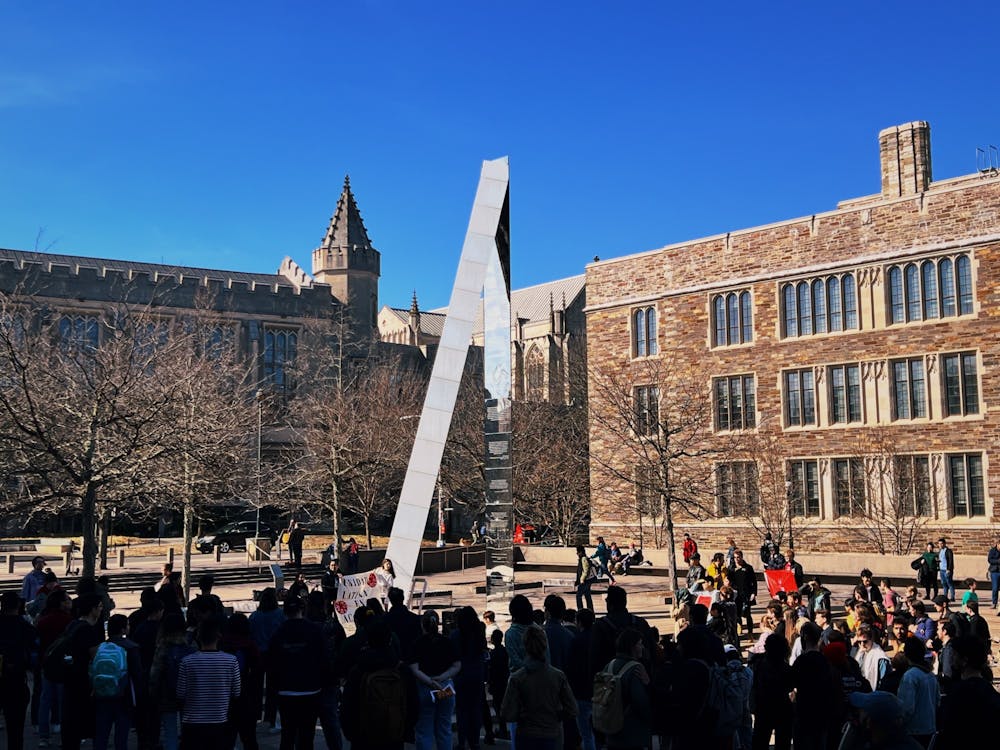Unlike many students across the country, my last all-nighter had nothing to do with my studies. In June 2020, the last month I was a graduate student at Oregon State University, I stayed on a Zoom call for almost 24 hours to support friends in my department who were members of the bargaining unit of our union, the Coalition of Graduate Employees (CGE). It was the last of the 180 days allotted for bargaining, so it was crucial that we reached a consensus before this deadline. Because of the pandemic, I could not be there with my friends — the least I could do was be a square on the screen, so the bargaining unit could see me. As the sun rose, I remember hearing the lead negotiator for the university say, “I think we can make that work.” I will never forget the intense joy felt by the breakout room participants, many of whom were on the verge of tears.
The sense of togetherness I felt with CGE helped me empathize with my fellow graduate students and connect their experiences to my own. I could relate to those facing housing and food insecurity — 85 percent of my stipend went to rent, and my first trips to a food pantry occurred during my graduate studies. My own experience reflected the many concerns of my peers at Oregon State, many of whom faced difficulties with budgeting our nine-month stipend, had anxiety when they were told what they were teaching days before the term began, encountered difficulties in securing affordable housing, struggled with inadequate health insurance and childcare support, and lacked adequate parking and transportation on campus.
In bargaining, CGE challenged Oregon State to address these concerns, often using testimonials so that the university could hear firsthand how these issues impacted our work. Listening to others, particularly those who confronted Oregon State representatives in bargaining sessions, allowed me to actually understand what activists and organizers throughout history meant by “solidarity” — to be together with others who have lived different lives from one’s own, and use that collectivity to work together for a brighter future. This power and solidarity are why unions like CGE and Princeton Graduate Students United (PGSU) are so important, and why graduate students have the unique opportunity to make history at Princeton by signing a union card.
Unions, whether they’re for graduate students, service workers, or other working people, are fundamentally about coming together to address systemic concerns in the workplace. They are the work of people of varying backgrounds and perspectives who believe that collective bargaining can guarantee better conditions for all. I cannot, nor can any single person, understand what graduate students at Princeton need as a whole, but when we work together, we can better understand systemic issues at the University in order to call for change.
I moved to the East Coast to begin my studies at Princeton and was introduced to PGSU through an organizer in my department. I was told how we are living in a particularly important era: the National Labor Relations Board is more welcoming of graduate students organizing unions than under previous presidential administrations. This is why other Ivy League institutions like Harvard, Yale, Columbia, and Brown, and other universities like Johns Hopkins, the University of Southern California, and Northwestern, have had successful election campaigns. We need to do the same. Graduate students at Princeton began the first steps in organizing a formal graduate student union in 2016, and we have been growing in our number of organizers across various disciplines and departments ever since.
I’m currently part of a small group of graduate students working on communications for the union. I don’t have the same courage and personality as some of my peers who can go into offices and other places where graduate students reside and speak for our cause, so sending emails and other communications became my way of supporting PGSU. Every graduate student has the ability to contribute to PGSU in the way that best suits them. We all can work together to make Princeton the best it can be for graduate students.
PGSU has organized around six core demands: fair and effective grievance procedures, improved support for international students, more comprehensive healthcare and childcare, affordable housing through graduation (with essential accommodations like air conditioning), guaranteed pay raises and contingency funding, and clear and safe standards for working and teaching. Each of these demands came from conversations graduate students had with their peers. PGSU is by and for graduate students, responding to the concerns heard across the University. Our platform reflects what we heard graduate students speak about in labs, offices, and reading rooms, and what the University needs to do to allow graduate students to do their work as researchers and educators.
Two weeks ago, over 150 graduate students and our allies held a rally in Scudder Plaza to announce our card-signing campaign. I felt the same passion I had experienced at the last bargaining session with CGE as I heard each speaker address a different concern among graduate students. Through cheers, chants, and applause, graduate students came together with a shared sense of what we can achieve when we organize together.

Princeton works because we do. Sign your union card today.
Alex Diaz-Hui, a third-year graduate student in the English department and Program in Latin American Studies at Princeton, is originally from the Pacific Northwest. He can be reached at adiazhui@princeton.edu.









